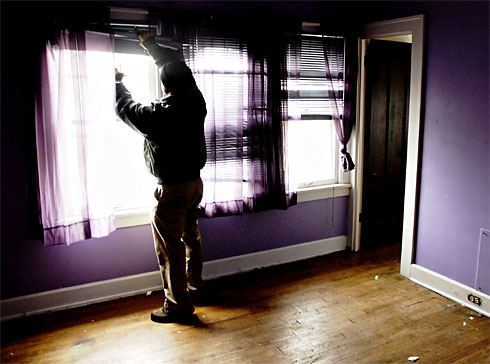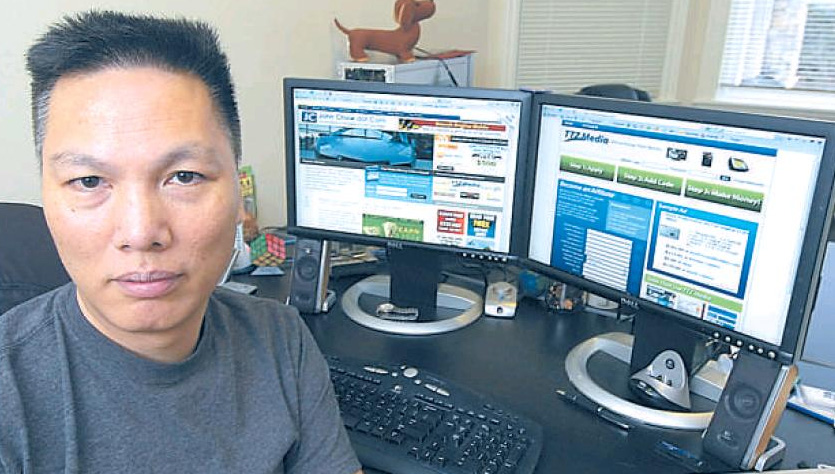Noelle Knox
USA Today

Lost Pond Construction’s Jeff Tortorea inspects a foreclosed home near Cleveland before putting it back on the market.
On the front lines in the mortgage foreclosure crisis, lender and loan servicer Dennis Lauria says his deepest losses are from borrowers who owe more than their homes are worth and simply mail in the keys, rather than try to work out a new payment plan.
“I can’t get you to pay if you’ve got no skin in the game,” says Lauria, senior vice president of Popular Mortgage Servicing in Cherry Hill, N.J., who says 14% of his customers with subprime loans — high-interest loans given to people with poor credit ratings — are in default.
Nearly 3 million homeowners were behind on their mortgages at the end of last year, the Mortgage Bankers Association (MBA) said last week. An additional 1 million-plus borrowers were at risk of imminent foreclosure. The number of foreclosures is likely to set records throughout the year and poses an increasing risk to the housing market, the financial markets and the economy.
Federal Reserve Chairman Ben Bernanke says the mortgage industry needs a “vigorous” response to help beleaguered homeowners. But what about the response — or lack of one — from borrowers?
In California, Florida and Nevada, particularly, where prices are falling the steepest, rising numbers of borrowers are giving up and abandoning their homes despite the significant damage a foreclosure can have on the credit ratings that determine their ability to get future loans.
Nationwide, more than half the borrowers who lose their homes through foreclosure never answered their lenders’ calls or letters, according to Freddie Mac. And an MBA analysis found that 23% of loans in foreclosure last fall were to homeowners who had no contact with their lenders, and that an additional 18% were to absentee owners.
The numbers help explain why it’s so difficult to reverse the trends of rising foreclosures and falling property values. Even some homeowners who can afford to pay their mortgages are defaulting, Lauria says, because their house might have lost 30% of its value, and they figure it will be a long time before it’s worth what they paid for it.
“They say, ‘If I play my cards right, I can live here free for 12 months, maybe longer’ ” before the lender can foreclose, Lauria says. “Our challenge isn’t contacting the borrower. I can talk to them, but they stick their tongue out at me.”
Hundreds of thousands of distressed homeowners are reaching out for help. The Homeownership Preservation Foundation, part of the Hope Now Alliance, fields more than 4,000 calls daily to its toll-free hotline (888-995-HOPE). But about 1 in 4 callers don’t want credit counseling, the foundation says. Many simply want financial relief.
Thary Yin, 26, who works at Wells Fargo’s call center in South Carolina, talks with 10 to 20 borrowers a day.
“A lot of the stories I hear from mortgagors are situations that are very, very extreme,” she says. “I talked to a cancer patient, and after Katrina hit New Orleans, the stories I hear. … Wells Fargo offers solutions on the mortgage side, but on the personal side, you can only cover so much on a phone call. Not being able to do more personally is the most difficult thing for me.”
Getting more aggressive
With home prices sliding and politicians calling for government and the mortgage industry to do more to help troubled homeowners, lenders and loan servicers such as Lauria are becoming more aggressive in contacting delinquent borrowers and modifying loans to make payments a bit easier.
Such tactics make sense for the loan industry: The last thing a lender wants is another vacant property to fix up and sell.
“We’re becoming more realistic about where the market’s going to go,” said David Sunlin, senior vice president for foreclosures and bankruptcy at Countrywide Financial, which is the nation’s largest mortgage lender and the focus of several government investigations into aggressive lending practices that made the company financially vulnerable.
With an inventory of nearly 40,000 foreclosed properties nationwide, Sunlin says, he will work with a borrower to try to sell a property, even with a sizable loss, up to the date it’s scheduled to be auctioned at a foreclosure sale.
At JPMorgan Chase, which has seen foreclosures jump 38% in the past two years, cases now go from collections to the “loss mitigation” department just five days after a borrower misses a payment, so the company can try to find a faster solution to keep the homeowner in the property. Not so long ago, the loss mitigation department didn’t get involved until 90 days after a missed payment.
As soon as a lender takes control of a property, the value begins to drop while the maintenance costs mount.
Safeguard Properties, a company many lenders use to change the locks, cut the grass and board up windows on foreclosed homes, has seen business rise more than 15% during the past year. A lender will pay $600 to $1,200, and more in some cases, for Safeguard to care for each property.
The largest surges in new foreclosures in the fourth quarter of 2007 were in California, Arizona, Nevada and Florida, where the frenzied real estate boom in the past several years attracted buyers who put little money down and got risky loans with virtually no proof of income.
Avoiding lenders
There are many reasons homeowners behind on their mortgages fail to contact their lenders, mortgage specialists say. Some don’t believe their lenders can help them. Others fear it will only speed the foreclosure process. And some don’t call because they simply don’t have money to give the lender, according to surveys by Wells Fargo and Freddie Mac.
“It’s (lenders’) own fault that borrowers won’t answer their calls,” says Todd Buckner, CEO of National Housing Solutions, a for-profit mediator between borrowers and lenders to stop foreclosures. “Their collections departments have beat (delinquent homeowners) over the head for months. It’s no wonder borrowers won’t answer the phone.”
To reverse public perception that they don’t want to work with troubled borrowers, lenders are hiring and training hundreds of employees to answer calls and help borrowers restructure their mortgages. They also are turning to more creative ways to try to reach at-risk homeowners.
The Hope Now Alliance, a coalition of 28 lenders and loan servicers supported by the Bush administration, has mailed more than 1 million letters since December to borrowers with subprime, adjustable-rate mortgages (ARMs). In many cases, the lenders are offering to freeze the borrower’s interest rate for five years. In other cases, borrowers may qualify for a 30-year, fixed-rate loan. Even so, the response rate has been less than 20%, on average.
To find homeowners who have stopped paying their mortgages and moved out, lenders use companies known in the trade as “skip tracers.” One of them, Players National Locator, for example, is receiving 7,000 cases a month from lenders looking to track down delinquent homeowners, up 20% since September.
Martin Goodman, president of Residential Capital in San Diego, sends his delinquent borrowers a $5 Starbucks gift certificate, along with documents that explain how his company can help them restructure their loans and avoid foreclosure. His response rate is only 10%.
But Goodman says making contact is only one challenge. The other is persuading delinquent borrowers to tell the truth about their financial condition. He suspects at least 90% of borrowers don’t explain the real reason they are falling behind on their payments out of fear it might accelerate their foreclosure.
“Everybody’s grandmother is dying. Everybody’s kid is having surgery,” Goodman says. “I’d rather somebody say, ‘We mismanaged our debt. This is what we make, and this is what we can afford.’ “
A ‘sense of entitlement’
As home prices fall from coast to coast, 8.8 million homeowners will have mortgage balances equal to or greater than the value of their property by the end of the month, Moody’s Economy.com. predicts.
That could come as a shock to consumers who thought property values would always rise, and it helps explain the attitudes lenders are seeing among their troubled customers, Goodman says.
“If you buy a car and it depreciates,” Goodman says, “you don’t expect the automobile dealer to write off your loan. There’s a sense of entitlement (among homeowners) that is just unbelievable.”
Goodman, whose firm specializes in home equity credit lines, says the main reasons people took out the loans were for home improvement, debt consolidation and medical expenses. But he estimates that about 20% used the cash to go on vacation or buy a new car.
Stories like his are fuel for the opposition in Washington against a government bailout for homeowners facing foreclosure. On the other side, consumer advocates such as the National Community Reinvestment Coalition (NCRC) can cite a litany of abusive lending practices that hurt homeowners.
“The government ought to get involved because there’s been a market failure,” said John Taylor, CEO of NCRC. “Our proposal is for the government to act as a cash-flow agent, to temporarily acquire the mortgages creating these problems long enough to refinance them into sensible terms and conditions. There would be no bailout because the government gets paid back.”
So far, the Bush administration has backed two initiatives from the Hope Now Alliance to help some homeowners avoid foreclosure. But their restrictions severely limit their effectiveness.
In December, for example, the alliance said it would freeze interest rates or refinance an estimated 1.2 million homeowners with subprime ARMs. To qualify for the interest-rate freeze, borrowers would have to be facing a 10% increase in their mortgage payment once their interest rate reset. But many subprime ARMs are tied to an international index that has fallen 2 percentage points since Christmas.
“In our portfolio, 60% of the borrowers who would have gotten fast-tracked (under the Hope Now plan) would not get that now that the rates have changed so much,” said Melissa Lucas, director of loss mitigation for Home Loan Services.
Instead of a payment increase of $450 a month, on average, her customers will see their payments rise by only $135. They may still qualify for other loan modification programs, she said, but not for the Hope Now plan.
FHA can help, sometimes
In a separate push, the administration backed this year’s temporary increase in the maximum loan limits of the Federal Housing Administration, which caters to first-time and low-income borrowers.
The FHA also has created a new loan program, called FHASecure, to help subprime borrowers refinance out of risky ARMs. Since it was announced in fall, the FHA has received about 277,000 applications and approved fewer than half of them.
In New Jersey, Lauria said he sent the FHA about 3,000 of his company’s delinquent loans to see how many could be refinanced under the FHASecure program. The answer: 61.
Even for the borrowers who contact their loan servicers, the options the companies can offer are tightly constrained by their contracts with investors who buy and sell pools of loans that are packaged as bonds.
But Lauria doesn’t believe every homeowner who can’t pay their mortgage can or should be saved.
“One-third of people who are delinquent should be in foreclosure. It’s the best alternative,” he says. “They don’t have the money. They shouldn’t have (gotten the loan) to begin with.”
And that’s why, he says, he doesn’t blame some of them for walking away from their homes.






